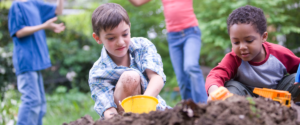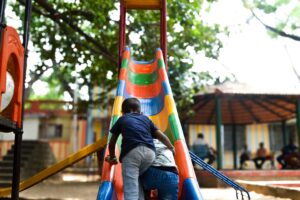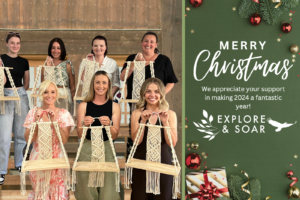
PLAY
This week we are going to chat about the importance of play and how it plays a roll not only in paediatric OT but in our lives as adults too!
I have to admit, playing is one of my favourite things to do. I enjoy being silly or cheeky, laughing, rolling on the floor or making a fool of myself. The joy I get from interacting with children is immeasurable. Whether it’s their bright eyes looking in wonder or their mischievous smile as they’re about to do something, it is incredibly rewarding to see a child enjoying themselves.
Despite how well some of you may know me, I can also be quite serious or passionate on occasion. But play itself is what keeps me grounded, and serves as a reminder to not take life too seriously, to enjoy the ride that it is.
This is how I fell in love with paediatric OT. I loved that I got to play, move my body and support little humans achieve their own goals. I got to encourage them to reach their highest potential by teaching them skills through play that put their new found abilities to use and ultimately promote growth. What I loved even more was that I could do this in families homes and schools and not be tied to a desk all day, everyday as well!
The role of play itself for our children is so important. Play and development forms the natural basis and foundations for the rest of their lives and continues to be a vital part of our development even into adulthood. Continuing to be playful positivity impacts upon our own mental well being, as well as our cognitive and emotional development over time.
Did you know that play even helps us prevent Alziehmers?! Now that is pretty amazing if you ask me!
Playing can be fun, exciting, exhilarating, challenging, frustrating and full of experiments. Through play we are constantly learning and changing over time. Play itself can come very naturally for some and continue to be hard work for others. The key to effective play for kids or even adults is find varied activities that spark joy.
Some children (or big children aka adults) enjoy being inside, playing with figurines, coloring and drawing. Whilst others are always on the go; climbing, running and getting into a little bit of mischief through physical activity. Some kids can also enjoy both! any of these activities in play are normal and each are a part of our own unique personalities – it’s important to identify what play develops self expression, learning and cognitive behaviour that matters.
So how exactly does play help children?
It’s simple really. When kids play, they are constantly learning. Learning through play is deemed fun.. So when they are enjoying learning something through play, they will be inclined to repeat the experience over and over again, therefore putting into practice their new found skills or behaviours. This can come to the adults detriments… As may seem to bore you with the amount of repetition they are consolidating these skills, learning and integrating them into their everyday life. In turn it becomes a part of their skill repertoire, advancing them into adulthood slowly but surely and allowing them to then learn a new skill.
It’s important to remember that the only way children will consolidate and learn these skills is through repetition. Repetition is so important! So as much as you would like to pack away that noisy toy and for it to never be seen again… (oops! We’ve all been there), just think about what your kids are learning beforehand.
Don’t you just love it when your kids are laughing and enjoying themselves? Did you know that laughter literally is the best medicine! When your child is laughing whilst playing, learning is happening at it’s fastest! So for all those families who have experienced my big over the top laugh with your kids, there is a method to my madness! Laughter = Fun = Learning = Fast!! For those who haven’t, that’s probably a good thing, it ain’t pretty! So keep looking for ways to make your kids laugh… I promise that it is helping and that you are doing amazing at it!
As we are hitting the back end of the year, fatigue and tiredness may be setting in and motivation is the last thing that you may be feeling, I get it. But when was the last time you all had a good laugh from playing games as a family? How often is it happening and can we make it happen more? And no I am not insinuating that this should be happening every waking minute of everyday… but inside your busy schedule I ask you this, how can you turn your everyday activities like dressing or bathing into a fun game? Remember by turning normal everyday activities into fun, your child is learning that this is an important skill to master.
So let’s get playing, laughing and being silly to foster learning together. We all need some more fun, joy and playfulness in our lives. Play more, be serious less.
Next time I’ll share with you exactly how I continue to envelop play in my adult life.
Until then, happy playing!
Jess.
ORIGINALLY PUBLISHED AUGUST 7, 2019






Leave a Reply